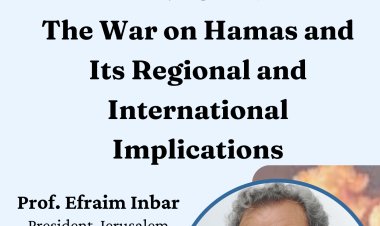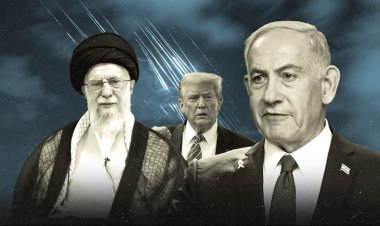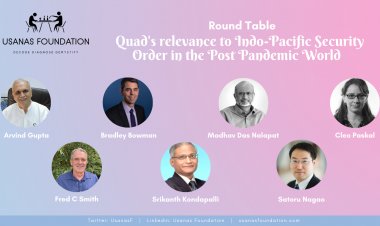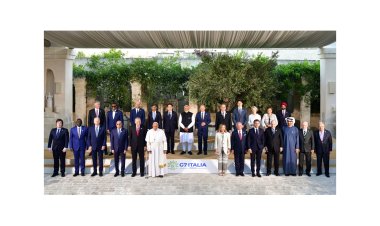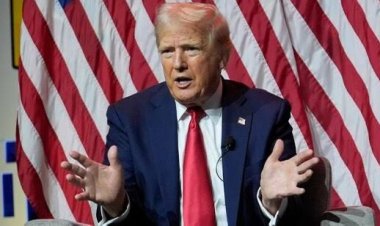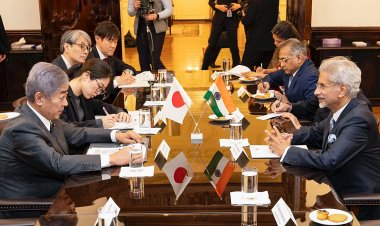India-Israel Ties: New Opportunities in the Middle East
Jaishankar’s trip to Israel highlights just how much India’s approach to the Middle East has changed in the last few years,
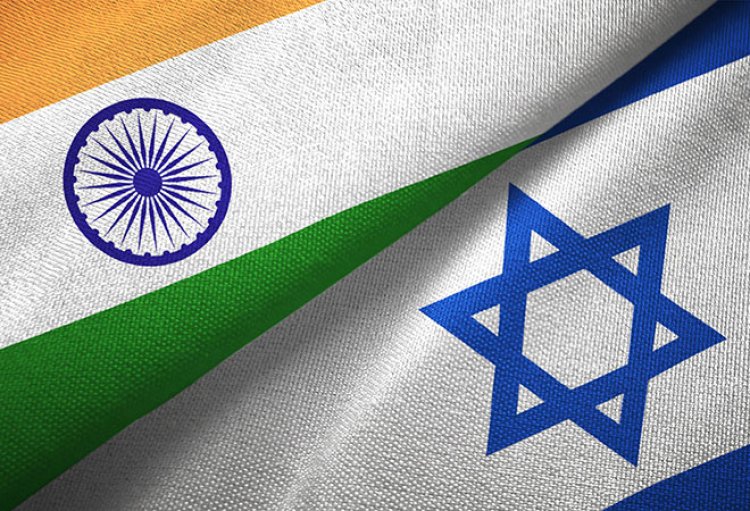
Commentary
By Alvite Ningthoujam
When it comes to India-Israel relations, it is very unusual and rare for discussions about military-security cooperation or arms deals to be positioned as only one of many agenda items during high-level visits. The two sides have generally focused on security cooperation, without leaders giving much attention toward augmenting cooperation in other fields as well.
But now this has changed. Expanded cooperation across the spectrum of bilateral relations is expected to be the pattern in Indo-Israeli ties from now on. Both countries, taking advantage of the upward trajectory of their relations, are interested in exploring new opportunities to forge not only bilateral cooperation but also trilateral and multilateral partnerships with liked-minded countries from the region and beyond.
The Significance of Jaishankar’s Visit
The just-concluded visit to Israel of Dr. S. Jaishankar, India’s external affairs minister, has clearly demonstrated the significant changing dynamic of India-Israel relations. Undoubtedly, it was an important visit, particularly considering that there is a new government in Israel, headed by Prime Minister Naftali Bennet, who calls India a “huge friend” and already has expressed his interest to “develop the unique and warm relations between the two democracies.”
Indicating political goodwill, Jaishankar extended an invitation from Indian Prime Minister Narendra Modi to his Israeli counterpart to pay an official visit to India. When this potential visit takes place, it is going to add fervor to the thriving ties between the two countries.
It is well known that Modi’s visit to Israel in July 2017, the first by an Indian head of government, is what truly sparked the development of strong political ties between India and Israel. For a considerable period, this was a missing link, and because of that both sides failed to reach the maximum potential of their interactions. This, however, has changed for the better, as is evidenced by the frequency in high-level visits of leaders from both the countries in recent years, reflecting the importance accorded by both countries to promoting bilateral cooperation.
Jaishankar’s visit has triggered a great deal of a debate, enthusiasm, and anxiety in India and abroad, both because of the salience of the bilateral discussions and because of the quadrilateral meeting he had with Israeli leaders as well as his counterparts from the United States and the United Arab Emirates.
Bilaterally, there were three key takeaways from Jaishankar’s visit. First, India and Israel agreed to resume talks for a free trade agreement starting in November. The FTA, if it materializes, would significantly increase the two nations’ economic ties. Second, the two sides agreed to mutually recognize each other’s COVID-19 vaccination certificates to increase international travel, a move that was significant in itself, but also a sign of the two sides’ intense cooperation in the health care sector since the outbreak of the COVID-19 pandemic early last year.
Third and finally, Israel will join the India-led International Solar Alliance (ISA), which aligns very well with the objectives of both countries to scale up their cooperation in renewable energy and partner in clean energy (an issue which I analyzed in another recent article). From the nature of the initiatives being discussed, it is clear that both countries are looking forward to adding more depth to their strategic partnership, which would unfailingly expand the scope of bilateral cooperation.
Tellingly, the Indian external affairs minister’s visit to Israel happened at an important juncture, marked by a political and strategic realignment in the Middle East. Several countries from the region and beyond are closely following the emerging geopolitical dynamics, mainly in the wake of the 2020 Abraham Accord, signed by Israel with two regional economic powerhouses, the UAE and Bahrain.
On one hand, Israel seeks to boost bilateral cooperation with India in a wide range of areas, including health care, big data, economics, technology, security, and so on. But simultaneously, there is also a strong signal coming from Indian, Israeli, and the Emirati leaders about their willingness to forge trilateral partnerships (following the Accord) and to form a “quad” of economic cooperation with the involvement of the United States. These four countries will likely focus on trade, maritime security, technology, and joint infrastructural development projects within the framework of this planned forum.
Considering the nature and the current momentum of their respective bilateral ties, the initiative they have envisaged looks promising, though it may take some time for the plan to gain momentum. The four countries have made clear that they will enter the quadrilateral partnership for their own benefit as well as the region, creating a win-win situation for everyone. This, however, is definitely going to raise eyebrows in certain countries, particularly China, which is already anxious about the original Quad, the strategic initiative between Australia, India, Japan, and the United States. Any future inclusion of a security component into this “quad in the Middle East” would irk Beijing, and it would, therefore, be interesting to watch its strategic moves in the upcoming period.
India and the Abraham Accords
India looked at the Abraham Accords with mixed interests when it was signed last year. Israel, though, was quick in envisaging potential partnerships between New Delhi and the signatories of the accord. An opinion piece published by previous Israeli ambassador to India Ron Malka in the Hindustan Times made amply clear Israel’s desire to work together with India, the UAE, and Bahrain on some key areas. Malka argued, “This historic agreement also brings opportunities for India, which enjoys strong bilateral relations with these developed and thriving economies. India will benefit greatly by expanding its cooperation in many areas including health care, energy, agriculture, cyber security, regional security, technology, water and more.”
India, for that matter, has been enhancing its cooperation with most of the Middle Eastern countries, not only Israel, in these areas over the last few years. Gone are the days when India’s ties to Middle Eastern partners were mostly determined by the oil-energy trade, the size of the Indian expatriate community, and the remittances that flow to the country. India’s relations with regional partners are becoming more comprehensive than ever before. It is, therefore, not going to be a difficult task to build partnerships involving Israel, the UAE, and India in areas like health care, technology, and energy.
It also is becoming apparent that the emerging geopolitical developments in the Middle East are opening doors for further engagements between India, regional countries, and the United States. This fits well into India’s current emphasis on multilateralism, “plurilateralism,” or “minilateralism,” which is increasingly becoming an important hallmark of its foreign policy under the present political dispensation.
There was already evidence of India, Israel, and the UAE jointly collaborating in the renewable energy sector back in May 2021. In first project of its kind, the International Federation of Indo-Israel Chambers of Commerce initiated a trilateral partnership with the UAE to develop an “innovative robotic solar cleaning technology.” In the near future, similar partnerships could also be explored with Bahrain, another party to the Abraham Accords, and also with European countries like France, with whom India is increasing its engagements in the renewable energy sector. Alongside this, there are other important countries, such as Saudi Arabia, Jordan, Oman, and Egypt, with whom India can initiate joint economic and strategic projects.
Looking at these recent developments, it appears that there is going to be an amalgamation of investments bringing together the economically affluent Gulf countries, Israeli-developed technologies, and the manufacturing skills of India, resulting in joint collaborations on key areas. Such partnerships will also hold importance for the Arab Gulf states, which are presently carrying out their respective economic development programs and thus require financial investment partnerships and technological assistance. Beyond this, there is potential for India to jointly collaborate with these countries in other fields, including defense industrial cooperation, co-production, artificial intelligence, innovation, space technology, etc.
In short, the possibilities are enormous for India and for the Middle Eastern countries in the presence of strong political goodwill between their governments.
Concluding Thoughts
The unfolding developments in the Middle East are positive not only for India but also for countries from this region that have finally agreed to shed their political and ideological differences and normalize ties by signing the Abraham Accords. This political breakthrough ushered in a new era of partnerships, driven by shared national and strategic interests. For Israel, in particular, this represents a hard-earned political recognition and acceptance in its own region, which has been hostile to it since its establishment in 1948. Israel will therefore focus on building better relations with the region and subsequently increase its strategic and economic clout close to home.
That countries like the United States, Israel, and the UAE exhibit strong interest in partnering with India in the Middle East and beyond reflects the growing importance they are according to this South Asian nation. This also implies that that India has a huge responsibility to live up to the expectations of its partners, which will mostly be interested in action-result-oriented strategies. India, at the same time, should tap this opportunity to not only enhance its ties with Israel but also strengthen its strategic footprints in the wider region. A more aggressive and proactive Middle Eastern policy is the need of the hour for India to reap the maximum benefit of the geopolitical realignments gradually being brought in by the Abraham Accords.
Amidst this, one should also not lose sight of what kind of a strategy China is going to come up with, looking at the possibility of another quad being formed in the Middle East. A display of realpolitik will be the trend for the foreseeable future.
Disclaimer: This paper is the author’s individual scholastic contribution and does not necessarily reflect the organisation’s viewpoint.
This article was originally published in The Diplomat.


